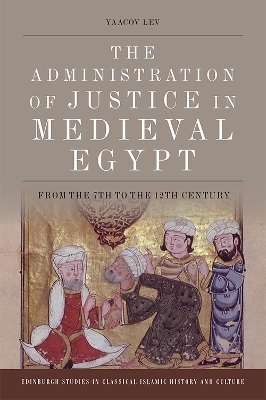
The Administration of Justice in Medieval Egypt
From the 7th to the 12th Century
Seiten
2020
Edinburgh University Press (Verlag)
978-1-4744-5923-5 (ISBN)
Edinburgh University Press (Verlag)
978-1-4744-5923-5 (ISBN)
This book shows how political and administrative forces shaped the way justice was applied in medieval Egypt. It introduces the model that evolved during the 7th to the 9th centuries, which involved 4 judicial institutions: the cadi, the court of complaint, the police/shurta and the Islamized market law.
This book shows how political and administrative forces shaped the way justice was applied in medieval Egypt. It introduces the model that evolved during the 7th to the 9th centuries, which involved four judicial institutions: the cadi, the court of complaint (mazalim), the police/shurta (responsible for criminal justice) and the Islamized market law (hisba) administrated by the market supervisor/muhtasib.
Literary and non-literary sources are used to highlight how these institutions worked in real-time situations such as the famine of 10241025, which posed tremendous challenges to the market supervisors in Cairo. The inner workings of the court of complaint during the 11th12th century Fatimid state are revealed through array of documentary sources. Further, non-Muslim communities, their courts and their sphere of responsibilities are treated as integral to how justice was dispensed in medieval Islam. Documentary sources offers significant insights into these issues and illuminate the scope and limits of non-Muslims self-rule/judicial autonomy.
In sum, the book shows that the administrative and political history of the judiciary in medieval Egypt implicitly and explicitly illuminates broader questions about religious and social forces that shaped the lives of medieval people in the Middle East, Muslims and non-Muslims alike.
This book shows how political and administrative forces shaped the way justice was applied in medieval Egypt. It introduces the model that evolved during the 7th to the 9th centuries, which involved four judicial institutions: the cadi, the court of complaint (mazalim), the police/shurta (responsible for criminal justice) and the Islamized market law (hisba) administrated by the market supervisor/muhtasib.
Literary and non-literary sources are used to highlight how these institutions worked in real-time situations such as the famine of 10241025, which posed tremendous challenges to the market supervisors in Cairo. The inner workings of the court of complaint during the 11th12th century Fatimid state are revealed through array of documentary sources. Further, non-Muslim communities, their courts and their sphere of responsibilities are treated as integral to how justice was dispensed in medieval Islam. Documentary sources offers significant insights into these issues and illuminate the scope and limits of non-Muslims self-rule/judicial autonomy.
In sum, the book shows that the administrative and political history of the judiciary in medieval Egypt implicitly and explicitly illuminates broader questions about religious and social forces that shaped the lives of medieval people in the Middle East, Muslims and non-Muslims alike.
Yaacov Lev is Professor (Emeritus) in Middle Eastern Studies at Bar Ilan University, Israel. He is author of several books including Saladin in Egypt (Brill, 1998), Charity, Endowments, and Charitable Institutions in Medieval Islam (University Press of Florida, 2006) and Towns and Material Culture in the Medieval Middle East (Brill, 2013). His most recent publications include articles in JSAI and Medieval Encounters, and a chapter in Developing Perspectives in Mamluk History, edited by Yuval Ben-Bassat (Brill, 2017).
| Erscheinungsdatum | 02.04.2020 |
|---|---|
| Zusatzinfo | Illustrations |
| Verlagsort | Edinburgh |
| Sprache | englisch |
| Maße | 156 x 234 mm |
| Gewicht | 610 g |
| Themenwelt | Sachbuch/Ratgeber ► Geschichte / Politik ► Allgemeines / Lexika |
| Geschichte ► Allgemeine Geschichte ► Mittelalter | |
| Geisteswissenschaften ► Geschichte ► Regional- / Ländergeschichte | |
| Geschichte ► Teilgebiete der Geschichte ► Militärgeschichte | |
| Recht / Steuern ► Rechtsgeschichte | |
| ISBN-10 | 1-4744-5923-4 / 1474459234 |
| ISBN-13 | 978-1-4744-5923-5 / 9781474459235 |
| Zustand | Neuware |
| Haben Sie eine Frage zum Produkt? |
Mehr entdecken
aus dem Bereich
aus dem Bereich
eine neue Geschichte des Mittelalters
Buch | Hardcover (2023)
C.H.Beck (Verlag)
CHF 53,20


